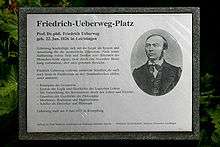Friedrich Ueberweg
Friedrich Ueberweg (German: [ˈyːbɐˌveːk]; 22 January 1826 – 9 June 1871), was a German philosopher and historian of philosophy.

(Plaque on Friedrich-Ueberweg-Platz, at the corner of Marktstraße and Mittelstraße in Leichlingen)
Biography
Friedrich Ueberweg was born in Leichlingen, Rhineland. Ostpreussen (East Prussia). His parents were Johann Gottlob Friedrich Ueberweg (August 19, 1797 - February 9, 1826), who was pastor of a Lutheran church in Leichlingen (the Evangelische Kirchengemeinde Leichlingen) (Evangelical Parish of Leichlingen), and Helene Boeddinghaus (October 24, 1798 - August 8, 1868). Helene was a daughter of Karl Theodor Boeddinghaus (February 21, 1765 - December 27, 1842), who was a Lutheran pastor in the neighboring town of Ronsdorf (previously he had held Lutheran pastorates, successively, in Rüggeberg, Düren, Witzhelden, Essen, and Dabringhausen).
Educated at the University of Göttingen and the Humboldt University of Berlin, Friedrich qualified at the University of Bonn as Privatdozent in philosophy (1852). In 1862 he was called to the University of Königsberg as extraordinary professor, and in 1867 he was promoted to the grade of professor ordinarius. He married Anna Henriette Luise Panzenhagen (August 24, 1844 - March 16, 1909) on September 1, 1863, in Seebad Pillau, Fischhausen, Ostpreussen (East Prussia). Ueberweg died in Königsberg in 1871.[1]
Philosophy
At first Ueberweg followed the empiricism of Friedrich Eduard Beneke (1798-1854), and strongly opposed the subjectivistic tendency of the Kantian system, maintaining in particular the objectivity of space and time, which involved him in a somewhat violent controversy. His own mode of thought he preferred later to describe as an ideal realism, which refused to reduce reality to thought, but asserted a parallelism between the forms of existence and the forms of knowledge. Beneke and Friedrich Schleiermacher exercised most influence upon the development of his thought.[1]
Selected works
- De elementis animae mundi Platonicae (On the elements of the Platonic world of ideas), Dissertation, 1850
- Die Entwicklung des Bewußtseins durch den Lehrer und Erzieher (The development of consciousness by the teacher and educator, 1853
- System der Logik und Geschichte der logischen Lehren (System of Logic and History of Logical Doctrines), 1857
- Über Idealismus, Realismus und Idealrealismus (On idealism, realism and ideal-realism), 1859
- Über die Echtheit und Zeitfolge der platonischen Schriften (On the authenticity and chronology of the Platonic writings), 1861
- Grundriß der Geschichte der Philosophie (Sketch of the history of philosophy), I–III, 1863–1866
- Schiller als Historiker und Philosoph (Schiller as historian and philosopher), 1884
- Gesammelte philosophische Abhandlungen (Collected philosophical papers), 1889
Ueberweg's compendious Sketch of the History of Philosophy (3 vols., 1863-1866) is remarkable for its fullness of information, conciseness, accuracy and impartiality.
References
- Chisholm 1911, p. 556.
Sources

- Friedrich Albert Lange (1828-1875) - Friedrich Ueberweg (Berlin, 1871)
- Moritz Brasch (1843-1895) - Die Welt und Lebensanschauung Friedrich Ueberwegs (Leipzig, 1889)